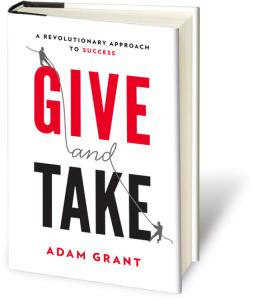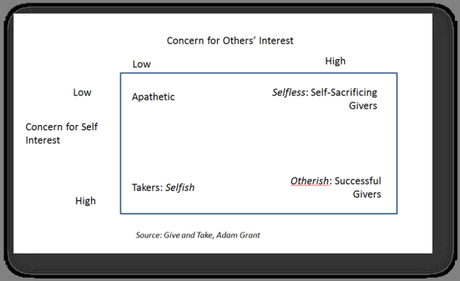(This is one of a series of posts on Give and Take by Adam Grant.)
In a previous post, I described what Adam Grant’s research found: that the human race is made of or Takers, Givers, and Matchers. Matchers represent the middle ground and comprise about 60 percent of the population. They tend to look for an equal balance of give and take, especially in the workplace.

Grant writes about a Canadian study of people who had received the “Caring Canadians” Award for lives of service and giving to others. It might be easy to assume that self- interest and interest in others’ well-being would be at opposite ends of a spectrum, but that turned out not to be true. In-depth interviews with the awardees uncovered high interest in helping others (“I care deeply about helping children escape poverty”, for example.) But the awardees also scored high in self-interest as well, wanting to achieve personal success and influence. They did well, and used their power, wealth and influence to do good.
Grant calls this mindset “otherish” – the opposite of “selfish.” Grant writes: “Selfless giving, in the absence of self-preservation instincts easily becomes overwhelming. Being otherish means being willing to give more than you receive, but still keeping your own best interests in sight.” This differs from matching in that otherish people don’t expect a match from every giving action; they still give with no expectation of return. They also know when to say no.
Selfless givers eventually burn out. They care more about others than they do their own wellbeing, and they often take on more than they can deliver. These are the givers most likely to fall prey to Takers, who see them as easy targets. Learning to say no – not just to Takers, but also to good causes that they just can’t take on – is essential to their health and their ability to give over the long run.
The chart below shows the relationship to concern for self, balanced with concern for others. Apathetic people care neither about themselves or others; selfish people care about themselves and seldom about others. Healthy otherish people know how to manage their giving, taking and taking care of themselves.
Where do you fit on the scale?

Grant doesn’t use the term “martyr” in his book, but you may have encountered what appeared to be selfless givers who aren’t really selfless at all. People with martyr syndrome draw loud attention to their “selfless” giving. They use their suffering and inconvenience as a ploy for sympathy and attention. One quick way to spot a martyr as opposed to an overextended giver: when you withdraw your request or offer to help, the overextended giver will probably be grateful and relieved. The work martyr will refuse your help; being miserable is part of what she gets out of the giving.
There’s a difference between doing good to do good and doing good to simply look good.

